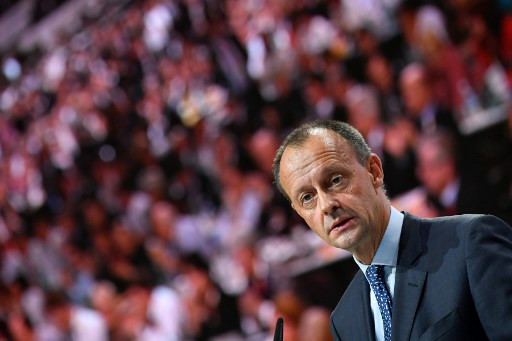Popular Reads
Top Results
Can't find what you're looking for?
View all search resultsPopular Reads
Top Results
Can't find what you're looking for?
View all search resultsAngela Merkel’s party chief to hold critical succession talks
Change text size
Gift Premium Articles
to Anyone
 In this file photo taken on Dec. 7, 2018, Friedrich Merz, one of the top candidates for the CDU party's leadership and former CDU parliamentary group leader, delivers a speech at a party congress of Germany's conservative Christian Democratic Union (CDU) party at a fair hall in Hamburg, northern Germany. The race to succeed Angela Merkel as Germany's chancellor continues after her protégé Annegret Kramp-Karrenbauer threw in the towel as leader of the center-right CDU party. Friedrich Merz will run for the leadership of the Christian Democratic Union (CDU), according to News agency DPA quoting sources close to him on Feb. 12, 2020.
(AFP/John MacDougall)
In this file photo taken on Dec. 7, 2018, Friedrich Merz, one of the top candidates for the CDU party's leadership and former CDU parliamentary group leader, delivers a speech at a party congress of Germany's conservative Christian Democratic Union (CDU) party at a fair hall in Hamburg, northern Germany. The race to succeed Angela Merkel as Germany's chancellor continues after her protégé Annegret Kramp-Karrenbauer threw in the towel as leader of the center-right CDU party. Friedrich Merz will run for the leadership of the Christian Democratic Union (CDU), according to News agency DPA quoting sources close to him on Feb. 12, 2020.
(AFP/John MacDougall)
T
he battle over who succeeds Angela Merkel as the next German chancellor candidate is entering a crucial phase on Tuesday when the outgoing head of her Christian Democratic Union will hold talks with a leading CDU politician to take over as party chief.
Annegret Kramp-Karrenbauer, who blew open the race to replace Merkel last week by announcing that she will resign, will meet Friedrich Merz as she tries to engineer a smooth transition and avert damaging internal bickering, according to a party official who asked not to be identified by name.
Merz, a former CDU caucus leader and long-term Merkel antagonist, is one of three leading candidates to replace the four-term chancellor, along with Health Minister Jens Spahn and Armin Laschet, the State Premier of North Rhine-Westphalia.
Kramp-Karrenbauer, widely known by her initials AKK, is due to meet Spahn and Laschet later this week, as well as two other potential CDU candidates, the party official said. She will then make a recommendation to CDU leaders Feb. 24 on how to proceed.
One of the two other candidates is Norbert Roettgen, a former environment minister who is head of the foreign policy committee in the Bundestag lower house of parliament. Roettgen, who announced his intention to run on Tuesday, belongs to the CDU’s liberal wing and was once a close Merkel confidant. But she fired him after he led the CDU to its worst electoral result in North Rhine-Westphalia in May 2012, failing to recapture Germany’s most populous state from the Social Democrats.
It’s the only example of Merkel actively firing one of her cabinet members.
More recently, the 54-year-old has taken a strong pro-European stance, while being critical of United States policy under President Donald Trump and taking a hawkish position on China, advocating that the German government rule out Huawei from its 5G networks. In today’s Bild newspaper, he calls for sanctions to be imposed on Russia for bombing civilians in the Syrian city of Idlib.
Unlike Roettgen, Merz has an early edge in the race. This is potentially bad news for Merkel as her aim to serve out her term through 2021 could fail if Merz wins the party chairmanship. Spahn has also gone on the attack, with Merkel seen as weakened by the collapse of her plan for AKK to succeed her.
Seven out of 10 CDU supporters see Merz as a good chancellor candidate, and across the political spectrum he’s ahead of his rivals with 40 percent approval, compared with Laschet’s 30 percent and Spahn’s 24 percent, according to an Infratest dimap poll for public broadcaster ARD.
The CDU wants the three main candidates to come to an agreement on who will run, according to the party official. That would avoid the kind of infighting that is seen as one reason for the collapse in support for Merkel’s junior coalition partner, the Social Democrats.
In a latest Insa poll for Bild published Tuesday, Merkel’s CDU/CSU bloc was on 26.5 percent at a national level, followed by the Greens on 20.5 percent, the far-right Alternative for Germany on 15 percent and the SPD on 14.5 percent.









